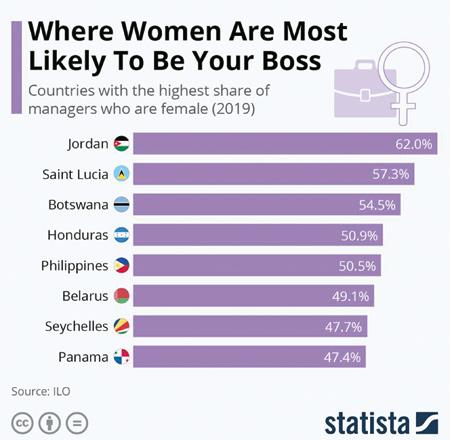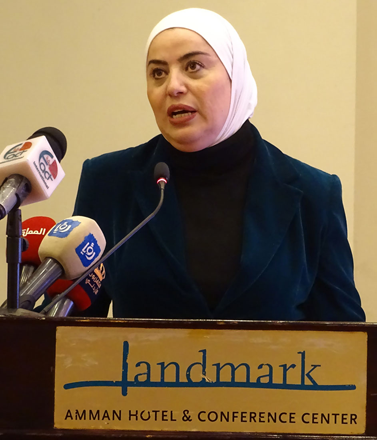You are here
Despite progress, women still face barriers to executive positions — ILO
By Ahmad Amaireh - Mar 09,2021 - Last updated at Mar 09,2021

Chart courtesy of Statista website
AMMAN — While women in Jordan hold a high rate in managerial positions, they are still underrepresented in executive positions, according to the International Labour Organisation, which emphasised that women are increasingly challenged into certain occupations and sectors.
In 2019, the ILO and the Department of Statistics (DoS) issued a statistic that ranks Jordan as the top country in the world where women hold managerial positions.
Recently, Statista, a leading business data platform, reshared this statistic and quickly made headlines. The platform’s post quickly went viral on local social media outlets highlighting Jordan leading the pack with 62 per cent of its managerial positions belonging to women.
However, while this is considered a great accomplishment for Jordan, the ILO shared a statement with The Jordan Times on Monday clarifying that while the statistic remains correct, it is important not to remove it out of context.
The ILO notes that “the 62 per cent figure is derived from estimations in which a majority of female respondents were from the education sector in Jordan, and only a minority were from other sectors. With education being a highly feminised sector, the likelihood of managers in this sector being women was high, as the majority of principals in schools and kindergartens are women”.
Frida Khan, the ILO’s Senior Gender Equality Specialist and Coordinator of the Jordan Decent Work Country Programme, said in the statement: “Removing female school and kindergarten principals from the sample reveals that only 2.7 per cent of women work in non-education sectors as junior and senior managers. This suggests that women are actually underrepresented in managerial positions, at a rate even lower than their already limited labour participation rate.”
In this regard, Reem Aslan, a gender technical specialist at ILO Jordan, told The Jordan Times that there needs to be special attention from the government on the highly feminised sectors, such as the educational sector.
She justified the need for attention by emphasising how the COVID-19 pandemic is specifically affecting female workers within this sector, consequently affecting private schools, kindergartens and nursery owners. Those owners require the financial support from the government to make it through the crisis, thus creating a full circle, she added.
According to ILO’s Changing Laws and Breaking Barriers for Women’s Economic Empowerment report, women were found to hold most of their occupations in business support functions, such as marketing, finance, human resources, public relations, or administration, while men dominate most of the occupations.
Women in Jordan still struggle with financial independence due to the lack of employment opportunities presented to them.
The 2019 database of DOS shows a significant gap in the ratio of employed females to males between the ages of 25 and 29, with 45,519 to 189,647. Female participation in the labour force in Jordan remains poor, at 14 per cent, compared with 54 per cent for men, despite the fact that women in Jordan are highly present in education and represent 53 per cent of university graduates.
Notably, the Gender Gap Index ranks Jordan 138th globally, 10th regionally, 113th in political empowerment, and 145th in economic empowerment and opportunity out of 153 countries, according to ILO’s most recent Gender Gap report.
The ILO is actively supporting women to stay in the labour market by covering their wages during maternity leave, as well as working on amending the maternity insurance of the social security law to include the cost of daycare of children under the age of five for working mothers within the private sector as well as the operational cost of nurseries up to 50 per cent of the annual operational cost with a ceiling of JD10,000, Aslan said.
Aslan stressed that it is critical to focus on new sectors, especially sport.
The ILO, in collaboration with the Ministry of Youth, recently launched the “Women in Sports” programme to encourage women to train young women in physical education programmes and provide them with secure employment in the sector, in response to a growing trend that emphasises the importance of staying healthy and fit.
Related Articles
AMMAN — Minister of Social Development Wafa Bani Mustafa called on the private sector to adopt a code of conduct that would ensure a friendl
AMMAN — The International Labour Organisation (ILO) and the Association of Banks in Jordan (ABJ) on Tuesday presented the outcomes of the in
AMMAN — Jordanian businesswomen on Saturday revealed their plan to renew calls for introducing a women’s quota in the chambers of trad
















